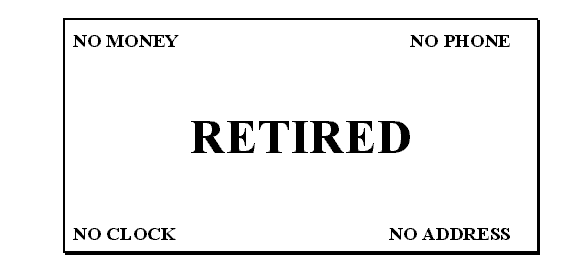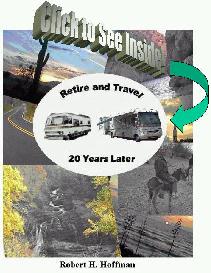Chapter 7 - The Hoffman Budget Book (Plus
Some Other Odds and Ends)
The Budget Book
One of the areas that new or potential motorhomers often ask about is in the buying of food for traveling. For example, Does limited onboard storage preclude buying in bulk? Answer: Not really. We bought food about every 5-10 days and had no problem storing it. If you get the "basement" type, you probably have as much storage as you can use. I would imagine that, at some point, you're more limited by concern of having too much weight rather than not enough space. Also, What foods are best from a cost/size/quality standpoint and what food types are easiest to prepare & eat? To both questions, the answer is that you can eat just as you do now at home. We only bought stuff that could be cooked on stovetop or in microwave (i.e., never used the oven), but this is just a matter of preference. It must be a preference for alot of people, however, because I notice that some of the new models no longer have the oven, just a microwave -- you can optionally choose to get storage space instead of an oven.
Another area people appear to be interested in is hints on how to avoid large repair costs. Their thought is that many garage owners would probably see the large motorhome and assume that the owner is wealthy and can afford whatever is charged. About the only hint I have there is to buy a new motorhome with a 12-month (or more) full guarantee and then hope that any major problems happen in the first 12 months/12,000 miles. Another hint might be to do as much of your own maintenance as possible. Spend some of your leisure time reading and learning about how to fix the motorhome yourself. Also, if possible, both spouses should be included in learning about motorhome maintenance. Our biggest month was May, when we spent $30 on a generator tune-up and $41 on an oil change. I would guess that full-timers probably change their own oil and save that $41.
Finally, if you haven't had your own motorhome, you might wonder about what kind of gas mileage to expect. The motorhome we had was a small one (23 feet) with a 454 cubic inch Chevrolet engine. It got about 8 miles to a gallon at 45 mph. We were told that for every mph over 45, you lose 1 mile per gallon. That means that at 53 mph, you're getting 0 mpg ... hmmm. We generally kept it right on 45 mph. I guess the only other hint might be to avoid the air conditioner whenever possible -- it robs you of about 1 mpg. We drove about 12,000 miles and spent $1500 for gas, so you could estimate that it cost us about 12.5 cents per mile. The gas at the time we were travelling was between $1.00 and $1.25 per gallon.
Related to the gas mileage information in the previous paragraph is the issue of how far and fast to travel. I have always driven at least 3-4 mph over the speed limit on the assumption that my speedometer is probably that far off anyway. In the motorhome, we traveled 45 mph almost all of the time. At first it seems real slow, but after awhile it begins to seem normal. Since we were either on a four-lane or a secluded country road most of the time, this speed didn't generally cause any traffic jams. When it did, we generally pulled off of the road and stopped to let everyone get back on their way. As far as distance per day, we generally traveled only about 200-250 miles in order that we could stop before dark to find a parking spot.
One bit of information that seems to fit here nicely is a discussion of where we kept our money. It didn't seem like a good idea to pack $5000 in cash with us and we assumed that getting checks cashed would be a problem. We could have used credit cards, but we didn't always get our mail on time and would probably have fallen behind on our payments. The thing we used that worked quite well was to put our money into a bank account that could be accessed by a national credit card -- in our case it was the American Express card. Then all we had to do was find an American Express money machine and get up to $500. This worked fine except one time at the Salt Lake City airport when it turned out that the money machine had been removed. The next machine on our route was in Las Vegas and we were rather low on money. As a matter of fact, we have a picture of me standing by the Nevada state line sign with $3 and a half-can of beer. That is all we had when we entered the state. Of course, there was a money machine in several of the casinos, so getting money after we got to Vegas was no problem. Since that time, the Anytime Teller machines have gotten much more popular and many are set up for national access, so finding a money machine is probably not as much of a problem as it was on our first trip. Update: Not really a problem any more, since ATM machines are everywhere and you can use your bank's ATM card in almost any of them -- of course, you pay extra fees when you go to a machine that's not from your own bank. Another item I've found extremely useful is a debit card -- it's like being able to write checks anywhere in the country. If you've got two checking accounts, get a card from each bank. Every now and then, your debit card will fail -- it'll be good to either have cash or a 2nd card as a backup.
Another topic of interest that occurred to me after talking to a few full-timers is choosing your state of residence. If you plan to travel the majority of the time, you actually can choose (to a certain extent) which state you want to be a resident of. The idea is to choose one that has no state income tax, has cheap license plates, and has low insurance rates. For example, we have relatives and friends in Florida which has no state income tax, so will probably establish residence there as soon as we hit the road. You use the relative or friend's address as yours to establish residence. Furthermore, I will try to choose someone who lives in a smaller town so that my insurance rates will be lower.
My last topic relates to staying in touch. When we were traveling, we would pick a town a couple of weeks away and my daughter would send the mail there General Delivery. The trick was to pick a town big enough for a Post Office, yet small enough to not have more than one. This worked ok, but several times we got there before the mail and would be forced to spend a day or two waiting for it. If you're in one of the clubs discussed above, they have some kind of a mail-forwarding system. Their system no doubt assumes that you are staying in one of their campgrounds each night. If this is a fact, then that would seem to be much easier than my General Delivery scheme.
Another aspect of staying in touch is the telephone. When we were getting ready to go on the road, I checked into mobile phones and found that they were only good for a 75-100 mile radius. It seems that since then the technology has improved significantly. I have heard that a mobile phone can be purchased that allows people to call you without knowing where you are in the country. No matter where you go, your phone number remains the same. I have also heard of some that can be purchased rather than leased -- I assume that these then have no monthly fee and that you are only charged for time used. If so, this would be ideal for use in the motorhome to allow people to get ahold of you in case of emergency. Update: Really obsolete with current cellular phone technology -- I've got one of the plans where you get a certain number of free minutes anywhere in the country with no long distance or roaming charges -- I'd recommend this for anyone who's travelling.
Epilogue
Honk and wave if you meet a Class A with a "RETIRED" tag on the front and two smiling faces in the front seats. Sooner or later, the one you honk at will probably be us. I hope the information in this book will help others to break out of the rat-race early as we plan to. If you find errors in what I have said, have more to add, or just want to correspond, you can write to me in care of the publisher.
I plan to write a sequel in a couple of years after I have found out how successful all of the plans described here actually work. Until then... happy motorhoming!
You're Visitor #
 | ||||
Retire and Travel For $1000 a Month

In this last chapter, I show some numbers from our budget book to let you see where we spent our money. This might be of some help to you in planning the expenses for your retirement or semi-retirement. I also include some odds and ends that I thought might be of interest, but that didn't fit into any of the other chapters. Update: Much of this is obsolete, due to the advent of ATM machines, cellular phones, etc. since 1990. Once again, I'm leaving it pretty much as written in 1990.
First, the budget book -- during our months on the road, we religiously recorded every penny spent. I guess we did this because I anticipated someday writing this book. We categorized the expenses as 1) cigarettes, 2) entertainment, 3) food, 4) gas, 5) LP gas, 6) miscellaneous, and 7) vehicle maintenance. The table below shows the totals and monthly averages for each of these seven categories (in the right-most columns) and monthly totals for all expenses (in the bottom row). At this point you're probably wondering where I got the title for the book (i.e., less than $900), since June cost $1348.46. Note that the average is less than $1000. As it turns out, Joyce and I have both quit smoking so this takes our average below $900 per month. In addition, you'll notice that the months of March through May were all under $900. In June, we had about $400 in unusual expenses such as staying in a hotel for two nights at $76, going to a dentist for $60, getting Joyce's hair cut for $32, and eating out a few times. I feel that over the period of a year or so, we will probably average less than $900 per month.
Now, to give you an idea of what the two categories of "entertainment" and "miscellaneous" are. Entertainment includes anything that we buy for enjoyment, but that we don't really need. Examples are art supplies, fishing tackle, licenses, bait, admission to parks, postcards, photographs, and going to a theater. Miscellaneous is a necessary expense that doesn't fit in any other category. Examples are road tolls, parking fees, gifts for friends that we stay with, gas for borrowed cars, maps, and laundry.


My First Book
Nothing in this site is copyrighted -- I'd be honored if you'd reuse anything you find here for your website
 | ||||||
IF YOU'VE READ THIS FAR, YOU MUST LIKE THE WRITING.
GET THE SEQUEL IN EBOOK NOW!
by Robert (and Joyce) Hoffman
The sequel is bigger, better, and will cost only you $10! It contains all of our combined RVing knowledge, gained through 20 years of experience! It has a new RV Basics chapter, a chapter on ways to reduce medical expenses, a chapter on how much you need to retire, and YESS!! a chapter by Joyce with views of an avowed RV non-enthusiast.
Gobs of info about retiring and RVing in an ebook for only $10!

